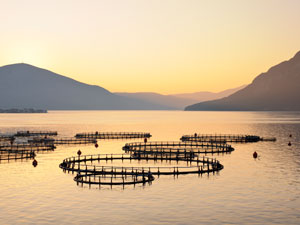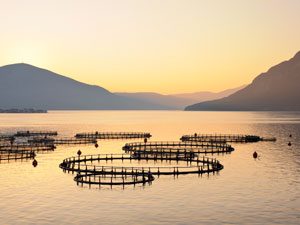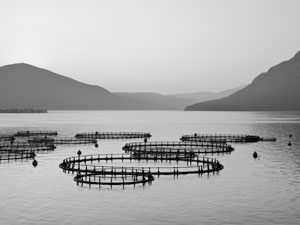
Dr. Rubén Avendaño: Innovación al servicio del desarrollo productivo de la acuicultura en Chile
En pocas décadas la salmonicultura se ha posicionado en Chile, logrando ser la segunda mayor fuerza exportadora después del cobre. No obstante, aún tiene muchos desafíos por delante. De ellos, los más importantes están ligados al ámbito sanitario, ya que luego de la crisis provocada por el virus ISA el año 2007, el ojo está puesto en la capacidad de enfrentar enfermedades de alto nivel de contagio, evitando mermas en la producción, reduciendo el uso de antibióticos y desarrollando productos para la prevención.

Es con este propósito que el Dr. Ruben Avendaño-Herrera, académico de la Facultad de Ciencias Biológicas Sede Viña del Mar de la Universidad Andrés Bello, investigador del Centro de Investigación Marina Quintay (CIMARQ) y miembro del centro FONDAP INCAR, junto al Dr. Rodolfo Paredes, llevan adelante una investigación, cuya finalidad es crear una base nacional de aislados bacterianos, permitiendo el desarrollo de técnicas de diagnóstico, estudios de susceptibilidad antimicrobia- no y generando una colección de cultivos bacterianos que estén al servicio de la producción.
El estudio, que cuenta con el apoyo de la Fundación para la Innovación Agraria y el patrocinio de Servicio Nacional de Pesca y Acuicultura, propone también el desa- rrollo de una herramienta tecnológica para identificar tempranamente patógenos bacterianos presentes en un centro de cultivo y así definir tratamientos acordes a cada situación.
El académico de la Facultad de Ciencias Biológicas destaca que el proyecto está basado en bacterias que no tienen programa de vigilancia activa, por lo tanto son patógenos de los que el Servicio Nacional de Pesca y Acuicultura no hace segui- miento. “Esta base nacional no sólo permitirá identificar los principales patógenos que atacan a los salmónidos, sino también a aquellas de las que no se tiene mayor conocimiento”.
Asimismo, el Dr. Avendaño-Herrera agrega que, al contar con una guía que especifique características y manifestaciones de patógenos, la industria tendrá la posibilidad de desarrollar vacunas efectivas para evitar enfermedades. “La idea es estimular el uso de vacunas que ataquen a aquellas bacterias que realmente representan la realidad sanitaria del país. De esta forma, podremos generar una verdadera ba- rrera de protección y disminuir el uso de antibióticos en los centros de cultivos”.
Descargar PDF: Innovación al servicio del desarrollo productivo de la acuicultura en Chile
Innovation at the service of productive development in Chilean aquaculture
In just a few decades, salmonid farming has become an important industry to Chile’s economy, coming second only to copper in exports. However, aquaculture still faces many challenges, the most important of which are associated with sanitary and health conditions. Following the 2007 infectious salmon anemia (ISA) outbreak, pressure is on the industry to manage highly contagious diseases while simultaneously preventing decreased production, reducing antibiotic use, and de- veloping new disease prevention/treatment techniques.

One investigator taking on these challenges is Dr. Ruben Avendaño-Herrera, researcher from Universidad Andrés Bello’s Faculty of Biological Sciences (Viña del Mar Campus) and the Quintay Marine Research Center of the Faculty of Ecology and Natural Resources, in addition to being a member of the FONDAP-funded In- terdisciplinary Center for Aquaculture Research (INCAR). Together with Dr. Rodolfo Paredes, from the Faculty of Ecology and Natural Resources, Dr. Avendaño-Herre- ra’s project aim is to construct a national database of bacterial isolates. This data- base will facilitate the development of diagnostic tools, promote further studies on antimicrobial susceptibilities, and provide a collection of bacterial cultures that can be applied towards bettering aquaculture production.
This research, which is supported by the Foundation for Agricultural Innovation (FIA) and National Fisheries Service (SERNAPESCA), also aspires to develop a diag- nostic tool for the early identification of bacterial pathogens in aquaculture cen- ters, which will aid in defining appropriate treatments.
Dr. Avendaño-Herrera highlights that the project is focused on bacteria that are not considered within active surveillance plans, meaning that these pathogens are not tracked by SERNAPESCA. “This national database will not only allow to identify the principal pathogens that attack salmonids, but also those that are more abundant.”
Dr. Avendaño-Herrera adds that by having a guide on the specific characteristics and manifestations of pathogens, the industry will be able to develop effective vaccines for disease prevention. “The idea is to promote the use of vaccines that attack those bacteria that are a true sanitary threat to the country. Through this, we will construct a real protection barrier and decrease the use of antibiotics in aquaculture centers”.
Download PDF: Innovation at the service of productive development in Chilean aquaculture
